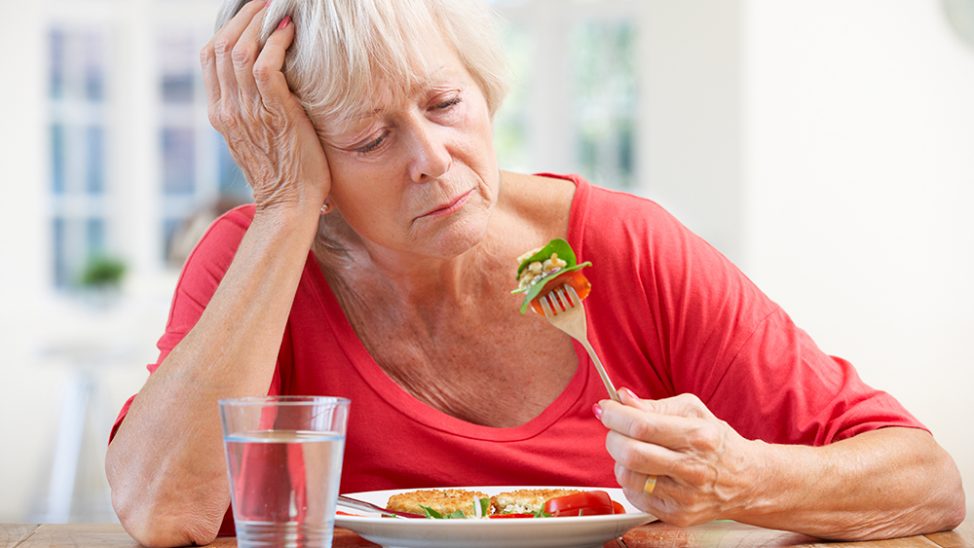Have you noticed the signs of malnutrition in your loved seniors? If yes, then it might be due to loss of appetite. Commonly observed malnutrition symptoms are fatigue, dizziness, brittle, or dry hair, cracked lips, and confusion.
Usually, a gradual decline in appetite is considered a normal part of the aging process. Older people have lower energy levels and take less part in physical activities. That is why they require fewer calories as compared to a younger person. However, if your elderly does not eat properly and experience undesirable weight loss, this can certainly cause concern because several studies have depicted that 10% overall weight reduction is strongly associated with a higher mortality rate in older people.
It is important to consult your physician when your older adults suddenly experience a reduction in their appetite. As several health conditions or medication side effects are the major contributors to loss of appetite in older age.
Some serious diseases, which can change appetite and taste in seniors, are:
• Neurodegenerative diseases such as Alzheimer’s and Parkinson’s disease
• Kidney problems
• Hepatitis • Cancer
• Thyroid disorders
• Gum diseases
• Throat and mouth infections
• Problems in salivary glands
Medication side effects, like the metallic taste and dry mouth, can change the taste of food and water, which leads to appetite reduction.
Anxiety, stress, and depression are common in old age and also contributing factors for loss of appetite in the elderly. The research has revealed that emotional turmoil can make them ill and nauseous, which reduces their desire to eat.
Another common factor that contributes to this issue is dental problems or poorly fitted dentures which can make your older adults reluctant to eat as well. It becomes difficult for them to eat properly when their teeth are slipping around the mouth or if it hurts to chew!
Being dehydrated can also lead to appetite loss in seniors. Several studies have indicated that most older people do not consume an adequate amount of fluid and unfortunately, they easily become dehydrated because of medications they are taking and age-related changes.
Loss of taste with growing age caused by aged taste buds that become less able to detect flavors is yet another cause of loss of appetite in seniors. That is why normal food flavor tastes bland and unappetizing to them that reduces their appetite.
There are many strategies to stimulate appetite in the elderly. Here are some that provides the most results:
• Change the size and frequency of meals served to seniors. They feel depressed when not being able to finish a whole meal. Eating small portions more often meaning 5 to 6 meals a day every 3 to 4 hours, works well for them.
• Add those ingredients to their diet that enhance appetite naturally, such as herbs and spices (cumin, basil, coriander). Research indicates that herbs can stimulate appetite due to the high content of essential oils.
• Maintain proper hydration level. You can also give infusions of fennel, peppermint, or dandelion because they enhance appetite level in the body.
• Focus on food presentation and company during their mealtime. A study has indicated that colorful and nicely served dishes encourage seniors to eat well. On the other hand, atmosphere and company are also crucial during mealtime.
In conclusion, loss of appetite is common in old age due to many reasons but no matter what causes it, it is always a cause of concern. Carefully monitor their appetite and solve the problem to prevent malnutrition. Add natural appetite boosters to the diet and present food well to improve the appetite in seniors.
References
1. Fernández, X., Ribó, L., Palomera, E., Papiol, M. and Serra, P., 2008. Loss of appetite in elderly people in the community and its relationship with functional capacity. Medicina clinica, 130(14), pp.531-533.
2. Hetherington, M.M., 1998. Taste and appetite regulation in the elderly. Proceedings of the Nutrition Society, 57(4), pp.625-631.
3. Pilgrim, A., Robinson, S., Sayer, A.A. and Roberts, H., 2015. An overview of appetite decline in older people. Nursing older people, 27(5), p.29.
4. Massler, M., 1980. Geriatric nutrition: the role of taste and smell in appetite. The Journal of prosthetic dentistry, 43(3), pp.247-250

